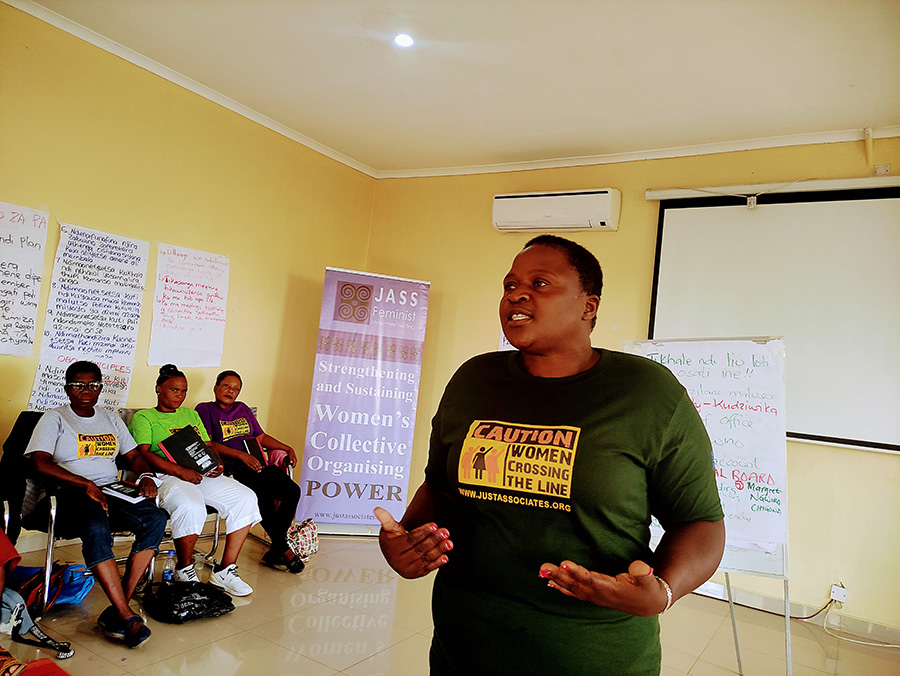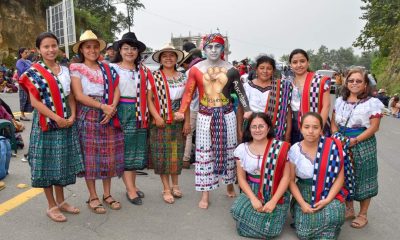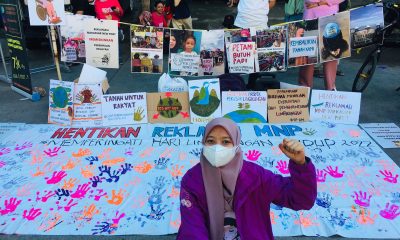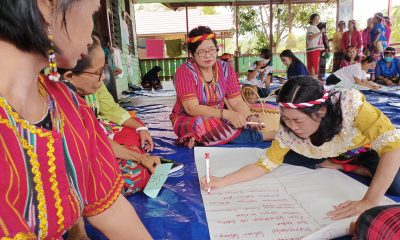By Laura Carlsen Km. 148 is a nodal point on the Interamerican Highway that connects…

Tiwonge Gondwe, a prominent woman leader of Our Bodies, Our Lives (OBOL), boldly states, “I have crossed the lines of breaking the culture of silence in my family, community, and society.” Comprising over 9,500 women from all 28 districts of Malawi, OBOL is a movement that mobilizes communities in the fight for equitable healthcare and economic security for women living with HIV.
Tiwonge’s journey with OBOL began almost 16 years ago. There from the start, she recalls when she connected with JASS, “When we started mobilizing and organizing women and girls in our area in 2006 [Rumphi district in the Northern region], people were saying that it will not work because it has never happened in their life and that when women are together they usually fight. This pained and made me feel powerless. But after participating in the feminist movement building processes organized by JASS, I started feeling powerful. I built my power within to challenge this stereotype of undermining women and built power with OBOL members to work hard and build a strong movement by sharing skills, knowledge, experiences, and capacity.”
The beginning
In 2007, even with the substantial increase in funding for HIV/AIDS-related initiatives in Malawi to combat the AIDS pandemic, HIV infection rates continued to rise. Although awareness of the impact on women—especially poor, rural black women—grew, their voices and leadership were missing from public discussions. There was a notable absence of a women-led agenda or any organized movement by HIV-positive women.
In response, JASS started organizing safe spaces for women to delve into the pandemic’s effects on their lives—share experiences, identify common challenges, and develop collective solutions. In 2008, Tiwonge and other women in her community observed changes in their bodies resulting from the widely-used antiretroviral treatment (ART) at the time, called D4T. This treatment contained stavudine, an outdated drug that caused numerous severe side effects, including visible physical deformities such as shrunken buttocks, loss of fat in the face, arms, legs, and buttocks, and prominent veins in the limbs.
“The ARV package in Malawi is rotten pie,” Tiwonge noted at the time, “And it is the women who are eating the biggest chunk of that rotten pie because we outnumber men in population and also in infection statistics.” These deformities caused stigma and shame and affected women’s sense of beauty, fertility, and sexuality.
Starting with “our bodies, our lives”
Over time, Tiwonge began to realize that her body matters and that by activating the power within and building solidarity with other women, they can change their situation. In her own words, “It was JASS who came in and asked us what was burning in our hearts, and then we started addressing the issue of deformation from ARVs. JASS has taught us how to put our voices together for collective action in order to name and shame the government, as well as to lobby for better quality ARVs. We wanted our dignity back.” Equipped with more confidence and skills, Tiwonge went back to her community to mobilize the women in her district to raise their voices.
For Tiwonge, the disparity of the discrimination she and other women experienced in her community was no greater than with her own husband’s family due to her HIV status and the fact that she was a widow:
“When a husband dies and the woman is left behind, there is a syndrome of saying that maybe the wife should be allowed to wear only one cloth [or change of clothes],” she begins. “The family will choose the color that she has to wear and sometimes she must put a white mark on herself to show that she has lost a husband, and she must wear [those] same clothes for a year to show that she is in deep, constant mourning.”
This cultural tradition in Tiwonge’s community is one that demands that widows isolate themselves as a sign of fidelity and ‘proper’ mourning, “She has to eat on separate dishes—no one except the wife has to do this, and I began to ask myself why?”
Tiwonge did not allow discrimination to discourage her. Instead, she confronted her father, who was also the village chief, about the issues affecting women and widows, including their lack of land ownership due to gender. Through her persistence, she was able to secure a piece of land to build a home and a small-scale farm.
Tiwonge’s activism did not just stop with her own situation—she decided that she wanted to fight with other women to make even bigger positive change: “I believe in collective power. When you use collective power effectively it enables you to engage with duty bearers and you don’t fear. It empowers you when you are talking, and you feel that there is nothing that can hinder you.”
Mobilizing collective power
Following a five-year organizing and leadership-training initiative supported by JASS and the Malawi Network of Religious Leaders Living with or Personally Affected by HIV and AIDS (MANERELA+), and the Coalition of Malawian Women Living with HIV/AIDS (COWHLA), the OBOL Campaign for Better ARVs was launched in 2012. Since then, our sustained movement building support and accompaniment have positioned HIV-positive women in the leadership of transformative health solutions for all. OBOL has upended stigma and exclusion from economic and political participation due to HIV status, replaced outdated and harmful medicines, educated health care providers and traditional leaders about HIV and sex, found common cause with religious leaders, and built a network of 30 activist hubs in every district of Malawi.
Women from OBOL are now an unstoppable force, embodying an alternative vision, narrative, and politics to address the structural drivers of exclusion, economic precarity, and discrimination. Through their organizing hubs, they ensure the continued implementation of health gains while mobilizing new rounds of political action and advocacy for basic needs and access to land.
In the past three years, OBOL women have successfully established 74 cooperative food gardens in 30 hubs and counting. These gardens feed their families and lay the foundation for further organizing around alternative economic strategies for secure livelihoods, better nutrition, and improved health.
For Tiwonge, there is still more to be done. She concludes, “My message for other women who are crossing the line is that don’t relax, keep on creating safe environments and fight injustices together! Leave no one behind, nothing for us without us, let’s raise our voices!”




























